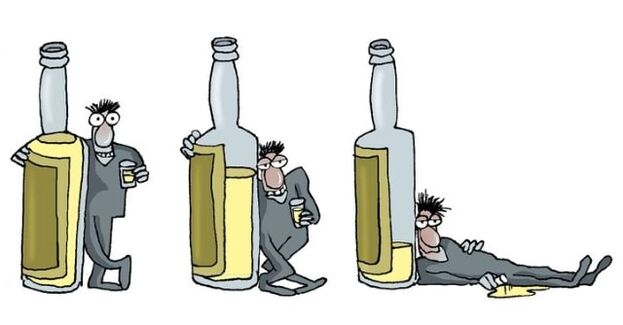According to statistics, men are twice as likely to suffer from alcohol dependence. Our society considers the regular consumption of alcoholic beverages to be absolutely normal, although the consequences of alcoholism in men are very deplorable for him and his family.
This opinion is obviously disastrous and should be reconsidered. Alcoholism is a serious illness that destroys a person's psyche and general health. It requires a comprehensive medical approach. As practice shows, even beer leads to steady alcoholism. It is with him that this disease begins, and later the person switches to strong alcohol.
External signs of alcoholism
Addiction forms and develops gradually, step by step. It is possible to recognize the presence of alcoholism and its development by a series of characteristic signs of alcoholism in men. Psychologists and narcologists have developed the main symptoms by which incipient alcoholism can be recognized:
- an irresistible craving for alcohol, a person is looking for the strangest reasons to justify his desire to drink;
- aggression against family, friends, co-workers;
- lethargy and fatigue;
- speech disorders;
- disorders of the musculoskeletal system;
- familiarity with dealing with strangers;
- apathy, mood swings;
- deterioration of general health.
These are the first signs of incipient alcoholism, which can last up to 10 years. It's easy not to see them at this stage, as is often the case. The woman just doesn't pay attention to them. Thinks a man relieves stress after work, tries to get out of trouble with a can of beer or a glass of brandy. Meanwhile, the disease does not stop and continues to progress.
Causes of male alcoholism
The problem of male alcoholism is dictated by the difference between female and male psychology. Males do not adapt well to changes in external conditions and resort to alcohol as a way to distract themselves from the problems and concerns that befall them. In addition, men often resist persuasion to undergo rehabilitation because they believe they are capable of handling the situation on their own.
But that's not the case - in addition to physical addiction, alcoholism brings profound personality changes from the first few months of abuse. The external environment usually consists of the same alcoholics, which also impedes healing.
Every second family in our country will face the problem of alcoholism in the future, or has already faced it. This affects all family members without exception, especially children. In general, the reasons for the emergence of this dependency can be divided into three types:
- Social;
- psychological;
- physiological.
They can appear individually or in combination. Social reasons include the presence of drinking friends in the environment. Social status plays a special role, as people with good jobs and higher education are less likely to face the problem of addiction. It is especially necessary to highlight the presence of stress at work, the level of well-being.
The psychological factors are:
- imbalance of the psyche;
- insufficient level of self-control;
- lack of motivation for professional and mental development;
- the presence of complexes;
- low self esteem.
There are several other factors that can lead to alcoholism in a man. Here are just the most common ones.
There is another group of factors that cause constant drunkenness - factors of a physiological nature. These are metabolic disorders that lead to rapid development of addiction and hereditary factors. If there were cases of alcoholism in previous generations, it is likely that they are relevant to subsequent descendants. The person thinks they will not become addicted and can easily give up alcohol at any time. A similar phenomenon is characteristic of alcoholics at all stages of alcoholism.
You can recognize an alcoholic by his eyes and look. Ethanol has a negative effect on the eyes, they get "glazed" and tired. Over time, bags under the eyes and swelling appear. This person looks tired. This indirectly indicates the presence of diseases of Organs internal organs.
From a person who drinks constantly, often comes the smell of "smoky" alcohol, which is hard to confuse with any other. People caught up in alcoholism generally do not take good care of their hygiene, appearance and do not hesitate to wear wrinkled and dirty clothes.
Stages of Alcoholism and Its Signs
There are several stages of alcoholism in men. There are only three of them, which come one after the other. The later treatment is started, the more difficult it will be to succeed - psychological dependence and an antisocial lifestyle impede treatment progress.

First stage signals
In the early stage of alcoholism development, a gradual increase in the amount of alcohol ingested is characteristic. There are a variety of reasons for this, this person starts looking for any reason to drink. At the same time, more and more, getting drunk more and more often. Relatives can hear excuses for this behavior:
If these phrases are accompanied by aggression, it is a clear sign of developing addiction. In addition, this phase is characterized by other signs associated with physiology:
- no vomiting reflex;
- more and more is needed to achieve the same degree of intoxication;
- there are blackouts.
All of these manifestations cause a deterioration in general health, worsen the concentration of attention and decrease efficiency. They appear more often during the transition to the next stage.
At this stage, it is already necessary to start the treatment of alcoholism in men - the earlier the stage, the greater the probability of success. In the first stage, drunkenness is completely cured and the body, after recovery, is restored to its original state, as the organs have not had time to suffer much and their functions are not greatly impaired.
A person cannot imagine his life without alcohol. That's how he spends all his free time. Therefore, problems can arise at work, because the employee who usually comes with a hangover gets even worse. As a result, conflicts with colleagues and managers begin. There are also many problems in family life.
Second stage signals
In the second phase of alcoholism in men, other characteristic signs appear. Withdrawal symptoms or hangovers are more pronounced here. Consists of nausea, headaches. There may be blackouts. Sleep and digestion are often disturbed. The craving for alcohol is already irresistible. The second-stage alcoholic can no longer stop drinking. It is the top priority around which all of life revolves.
Furthermore, this stage of the disease is characterized by mental disorders - alcoholic psychoses. This expresses itself in an unstable emotional state, frequent manifestations of aggression, inappropriate behavior and unjustified irascibility.
Third stage signals
This is the last stage of alcoholism. At this stage, it is necessary to urgently hospitalize the patient to save his life. Complete personality degradation sets in and moral values become indifferent. An alcoholic's main goal is to get a fresh helping of alcohol, and because of that, he can do anything, including breaking the law. Also occurs:
- intoxication comes from small doses;
- the hangover is very difficult;
- sleep depends on the amount ingested, as does food intake.
According to medical statistics, the average lifespan of an alcoholic at this stage does not exceed five years. Due to the constant poisoning of the body, the following symptoms may appear:
- intellectual degradation;
- loss of speech or severe speech disorders;
- high risk of strokes, heart attacks, paralysis, severe liver and kidney dysfunction.

If these symptoms start showing up, you need to understand that the addiction is only growing. The basis for effective and successful treatment is the patient's own desire to get rid of the addiction. The situation is complicated by the fact that alcoholics are often drunk and unable to make informed decisions. This greatly complicates the dialogue with this person.
Beer alcoholism should be noted separately. Now this problem is gaining more and more weight in society. As a rule, many are convinced that beer cannot cause alcoholism. Narcologists have a different opinion on this matter - frequent drinking of beer can cause persistent alcoholism. It manifests itself in the need to drink this beverage constantly, and in large quantities. Gradually, the amount of drink increases. In that case, it's also worth sounding the alarm and starting the rehabilitation process to get rid of this addiction.
The consequences of alcoholism in men
No matter how strong the body, the consequences of alcoholism in a man will not be long in coming. They can be conditionally divided into two types - psychological and physiological. The latter can manifest itself in disturbances in the functioning of various body systems:
Alcoholism also affects the human psyche. These violations can manifest themselves in strange behavior:
If such phenomena appear, you should immediately contact a competent psychologist who works with alcoholics. It's important to know that you can start treating alcoholism in a man at any stage.
Steps to recovery
- Step 1. Contacting a specialized clinic
- Step 2. Persuade the addict for treatment
- Step 3. Detoxification (cleansing the body of toxins)
- Step 4. Comprehensive rehabilitation in an inpatient center
Only in a rehabilitation center, the man will not only be helped to alleviate the physiological dependence, but will also be brought to a complete cure with the help of hospital treatment, and will follow the first steps in life after rehabilitation.
Of course, the sooner qualified assistance from narcologists is provided, the faster and easier the process of getting rid of this disease will be. Therefore, if you have the slightest suspicion, contact an expert immediately.
























